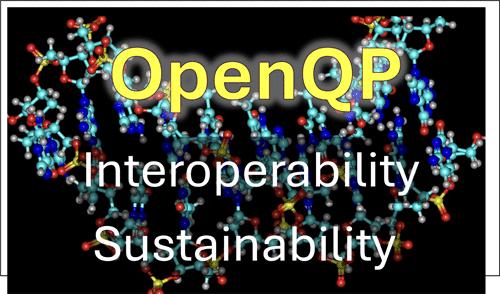当前位置:
X-MOL 学术
›
J. Chem. Theory Comput.
›
论文详情
Our official English website, www.x-mol.net, welcomes your
feedback! (Note: you will need to create a separate account there.)
OpenQP: A Quantum Chemical Platform Featuring MRSF-TDDFT with an Emphasis on Open-Source Ecosystem
Journal of Chemical Theory and Computation ( IF 5.7 ) Pub Date : 2024-10-30 , DOI: 10.1021/acs.jctc.4c01117 Vladimir Mironov, Konstantin Komarov, Jingbai Li, Igor Gerasimov, Hiroya Nakata, Mohsen Mazaherifar, Kazuya Ishimura, Woojin Park, Alireza Lashkaripour, Minseok Oh, Miquel Huix-Rotllant, Seunghoon Lee, Cheol Ho Choi
Journal of Chemical Theory and Computation ( IF 5.7 ) Pub Date : 2024-10-30 , DOI: 10.1021/acs.jctc.4c01117 Vladimir Mironov, Konstantin Komarov, Jingbai Li, Igor Gerasimov, Hiroya Nakata, Mohsen Mazaherifar, Kazuya Ishimura, Woojin Park, Alireza Lashkaripour, Minseok Oh, Miquel Huix-Rotllant, Seunghoon Lee, Cheol Ho Choi

|
The OpenQP (Open Quantum Platform) is a new open-source quantum chemistry library developed to tackle sustainability and interoperability challenges in the field of computational chemistry. OpenQP provides various popular quantum chemical theories as autonomous modules such as energy and gradient calculations of HF, DFT, TDDFT, SF-TDDFT, and MRSF-TDDFT, thereby allowing easy interconnection with third-party software. A scientifically notable feature is the innovative mixed-reference spin-flip time-dependent density functional theory (MRSF-TDDFT) and its customized exchange-correlation functionals such as the DTCAM series of VAEE, XI, XIV, AEE, and VEE, which significantly expand the applicability scope of DFT and TDDFT. OpenQP also supports parallel execution and is optimized with BLAS and LAPACK for high performance. Future enhancements such as extended Koopman’s theorem (EKT)-MRSF-TDDFT and spin–orbit coupling (SOC)-MRSF-TDDFT will further expand OpenQP’s capabilities. Additionally, a Python wrapper PyOQP is provided that performs tasks such as geometry optimization, conical intersection searches, and nonadiabatic coupling calculations, among others, by prototyping the modules of the OpenQP library in combination with third-party libraries. Overall, OpenQP aligns with modern trends in high-performance scientific software development by offering flexible prototyping and operation while retaining the performance benefits of compiled languages like Fortran and C. They enhance the sustainability and interoperability of quantum chemical software, making OpenQP a crucial platform for accelerating the development of advanced quantum theories like MRSF-TDDFT.
中文翻译:

OpenQP:以 MRSF-TDDFT 为特色的量子化学平台,重点是开源生态系统
OpenQP(开放量子平台)是一个新的开源量子化学库,旨在解决计算化学领域的可持续性和互操作性挑战。OpenQP 以自主模块的形式提供各种流行的量子化学理论,例如 HF、DFT、TDDFT、SF-TDDFT 和 MRSF-TDDFT 的能量和梯度计算,从而允许与第三方软件轻松互连。一个科学上值得注意的特点是创新的混合参考自旋翻转时间依赖性密度泛函理论 (MRSF-TDDFT) 及其定制的交换相关泛函,如 VAEE、XI、XIV、AEE 和 VEE 的 DTCAM 系列,显着扩展了 DFT 和 TDDFT 的适用范围。OpenQP 还支持并行执行,并使用 BLAS 和 LAPACK 进行了优化以实现高性能。未来的增强功能,如扩展的考夫曼定理 (EKT)-MRSF-TDDFT 和自旋-轨道耦合 (SOC)-MRSF-TDDFT 将进一步扩展 OpenQP 的功能。此外,还提供了一个 Python 包装器 PyOQP,它通过与第三方库组合 OpenQP 库的模块原型来执行几何优化、圆锥交点搜索和非绝热耦合计算等任务。总体而言,OpenQP 通过提供灵活的原型设计和操作,同时保留 Fortran 和 C 等编译语言的性能优势,与高性能科学软件开发的现代趋势保持一致。它们增强了量子化学软件的可持续性和互操作性,使 OpenQP 成为加速 MRSF-TDDFT 等高级量子理论开发的重要平台。
更新日期:2024-10-30
中文翻译:

OpenQP:以 MRSF-TDDFT 为特色的量子化学平台,重点是开源生态系统
OpenQP(开放量子平台)是一个新的开源量子化学库,旨在解决计算化学领域的可持续性和互操作性挑战。OpenQP 以自主模块的形式提供各种流行的量子化学理论,例如 HF、DFT、TDDFT、SF-TDDFT 和 MRSF-TDDFT 的能量和梯度计算,从而允许与第三方软件轻松互连。一个科学上值得注意的特点是创新的混合参考自旋翻转时间依赖性密度泛函理论 (MRSF-TDDFT) 及其定制的交换相关泛函,如 VAEE、XI、XIV、AEE 和 VEE 的 DTCAM 系列,显着扩展了 DFT 和 TDDFT 的适用范围。OpenQP 还支持并行执行,并使用 BLAS 和 LAPACK 进行了优化以实现高性能。未来的增强功能,如扩展的考夫曼定理 (EKT)-MRSF-TDDFT 和自旋-轨道耦合 (SOC)-MRSF-TDDFT 将进一步扩展 OpenQP 的功能。此外,还提供了一个 Python 包装器 PyOQP,它通过与第三方库组合 OpenQP 库的模块原型来执行几何优化、圆锥交点搜索和非绝热耦合计算等任务。总体而言,OpenQP 通过提供灵活的原型设计和操作,同时保留 Fortran 和 C 等编译语言的性能优势,与高性能科学软件开发的现代趋势保持一致。它们增强了量子化学软件的可持续性和互操作性,使 OpenQP 成为加速 MRSF-TDDFT 等高级量子理论开发的重要平台。




















































 京公网安备 11010802027423号
京公网安备 11010802027423号